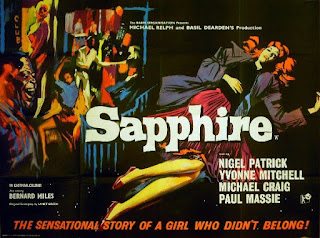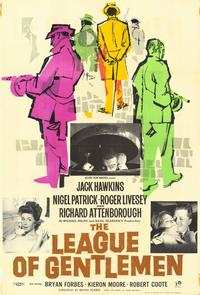Eclipse Series 25
Retail $59.95
Amazon $49.99
For those who may not know, Criterion came out with an Eclipse line of films in 2007, a series of boxed sets of affordable DVD editions featuring hard-to-find, forgotten, or somewhat obscure films. These films do not include either the extras (other than some liner notes) or the level of remastering film lovers have come to expect from the regular Criterion Collection titles, although the transfers are quite good. (On a purely practical level, the films come in individual slim cases in a box that’s open at both the top and bottom, so be careful in handling these sets.)
Each set usually focuses on a theme, a style, or a director. Two or more films (usually three or four) are included in each set and sets are priced accordingly. You can find a complete list of the Eclipse series here.
I found this Series 25 set at a Borders that was going out of business a few years back and decided to take a chance on it (since all the DVDs and sets at that point were 60% off). It turned out to be a risk worth taking.
Basil Dearden (1911-1971) directed films at West London’s Ealing Studios during the 1940s and 50s before deciding to tackle more controversial subjects on his own, subjects he knew the studio would never touch. The four films in this Eclipse set are enclosed in an atmosphere of post-WWII complacency while looking ahead to the cultural changes that would explode in the 60s. While these particular tones are present in all of these films, each title focuses on a particular point of controversy, in most cases, well before their intended audiences were ready for them.
Sapphire (1959) 92 min.
The body of a beautiful young woman named is found dead at the opening of the film, leading police on a winding path for her killer. Sounds pretty routine, but Sapphire (the only color film in the set) is a police procedural focusing not only on a murder, but also post-war racial conflict. The film contains many good scenes, but as a police procedural, it’s a bit stiff and heavy-handed. Yet the cinematography and performances are quite good. Remember that Dearden is trying to make his 1959 audience see something they either hadn’t or didn’t want to see.
The League of Gentlemen (1960) 116 min.
The lightest in tone of the four films, The League of Gentlemen is a wonderful heist movie and contains the least amount of social commentary. That doesn’t, however, mean it’s without social commentary. Former Army Lieutenant-Colonel Norman Hyde (Jack Hawkins) secretly assembles a group of ex-army officers (a la And Then There Were None Style), each being enticed to attend a meeting via an envelope containing an American paperback entitled The Golden Fleece, half a 5£ note, and an invitation from an organization called “Co-operative Removals Limited.”
This odd “band of brothers” - all of them bored, disenfranchised veterans with checkered pasts - makes this sort of a pre- Oceans-11 (which also came out in 1960) type of film. It’s a lot of fun. Any time you can see Hawkins (one of my favorite British actors), do so.
Victim (1961) 100 min.
Victim has the distinction of being the first English-language film to use the word “homosexual.” As such, the film was considered highly controversial in England and banned for a brief time in the U.S. You have to remember that homosexuality was actually a crime in England until 1967. That knowledge gives Victim a lot of power and displays Dearden’s courage in making it.
Dick Bogarde plays Melville Farr, a respected barrister with a secret life that’s about to be exposed by a blackmailer. The film would stand on its own as a good mystery drama even without the then controversial element. Again, seen in 2013 it might be hard to understand what the fuss was all about, but put yourself in that era, and the film becomes frank, honest and gutsy.
All Night Long (1962) 91 min.
All Night Long takes place during a single rainy night of nearly non-stop jazz as well as non-stop jealousy and back-stabbing. A rich London music promoter decides to throw a party for jazz musician Aurelius Rex and his new bride Delia, a retired jazz singer. Although Delia is content to retire from the spotlight and spend time with her new husband, an ambitious drummer named Johnnie Cousin (Patrick McGoohan from the TV show The Prisoner) wants her to headline his new band. The film is something of a retelling of Shakespeare’s Othello in the jazz world, and is also played out in a house that acts somewhat like a stage: enclosed, often claustrophobic and tense. All Night Long offers some very good scenes and some nice jazz, featuring cameos by jazz legends Dave Brubeck and Charles Mingus.
While I greatly enjoyed this set, and look forward to watching all these films again in the coming years, I’d be very hesitant to take a chance on buying another Eclipse set. The guys on the Criterion Cast podcast (You can find them on iTunes.) sometimes report that some of the Eclipse films air on the Hulu Plus channel, which gives you an opportunity to watch before you buy. Or your public library may have some of these sets. (Our system currently owns four sets: Lubitsch Musicals, Rossellini’s History Films, Alexander Korda’s Private Lives and the First Films of Akira Kurosawa.) If Criterion’s purpose in producing these sets (after making a profit, of course) is to bring an awareness of these films to film lovers (or even the curious), the retail prices are still pretty high.
I don’t know how well these sets are selling, but for several months, Criterion produced no new Eclipse titles. Finally, a few days ago, Criterion announced the April 2013 release of Eclipse Series 38: Masaki Kobayashi Against the System (four discs priced at $59.95 retail). (For more information on both the Eclipse sets and all Criterion releases, I highly recommend the Criterion Cast.)
I would never buy any of these sets at full price sight unseen, but I know there are probably people who do. If I saw two out of four films of a set on Hulu Plus (or somewhere else) and liked them, I might buy the set. But if the sets were more reasonably priced and I’d only seen (and enjoyed) one of the films, I’d be more likely to buy the set. (As far as I know, the movies in the Eclipse sets are not available individually.)
Or maybe I’d be more enticed to buy more sets if Criterion had some type of club or incentive in place. Maybe for every regular DVD or Blu-ray purchase, Criterion could give a coupon for a certain percentage off the price of an Eclipse set. I hope the Eclipse line isn’t going away, but I also hope accessing them gets easier and/or more affordable. If they do, you’ll see more of them reviewed here. Based on the Basil Dearden set, I’m definitely interested in more Eclipse sets.









No comments:
Post a Comment